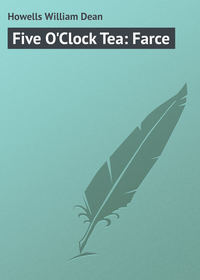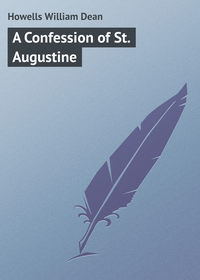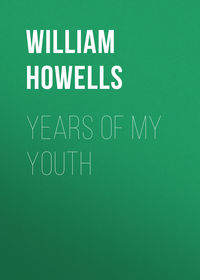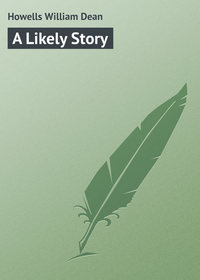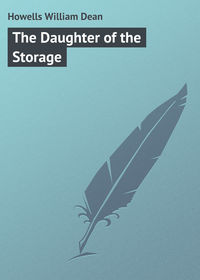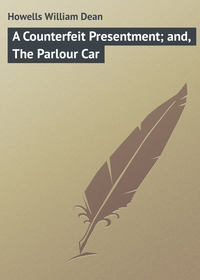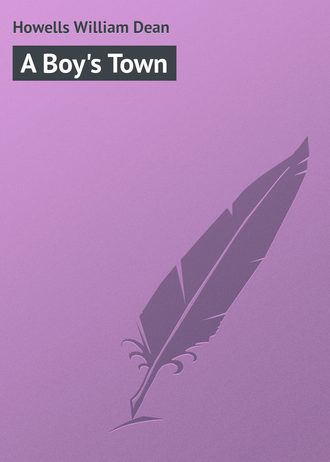 полная версия
полная версияA Boy's Town
Among these were a family of white rabbits, which the boys kept in a little hutch at the bottom of the yard. They were of no more use than the goat was, but they were at least not mischievous, and there was only one of them that would bite, and he would not bite if you would take him up close behind the ears, so that he could not get at you. The rest were very good-natured, and would let you smooth them, or put them inside of your shirt-bosom, or anything. They would eat cabbage or bread or apples out of your hand; and it was fun to see their noses twitch. Otherwise they had no accomplishments. All you could do with them was to trade with other boys, or else keep the dogs from them; it was pretty exciting to keep the dogs from them. Tip was such a good dog that he never dreamed of touching the rabbits.
Of course these boys kept chickens. The favorite chicken in those days was a small white bantam, and the more feathers it had down its legs the better. My boy had a bantam hen that was perfectly white, and so tame that she would run up to him whenever he came into the yard, and follow him round like a dog. When she had chickens she taught them to be just as fond of him, and the tiny little balls of yellow down tumbled fearlessly about in his hands, and pecked the crumbs of bread between his fingers. As they got older they ran with their mother to meet him, and when he sat down on the grass they clambered over him and crept into his shirt-bosom, and crooned softly, as they did when their mother hovered them. The boy loved them better than anything he ever had; he always saw them safe in the coop at night, and he ran out early in the morning to see how they had got through the night, and to feed them. One fatal morning he found them all scattered dead upon the grass, the mother and every one of her pretty chicks, with no sign upon them of how they had been killed. He could only guess that they had fallen a prey to rats, or to some owl that had got into their coop; but, as they had not been torn or carried away, he guessed in vain. He buried them with the sympathy of all the children and all the fellows at school who heard about the affair. It was a real grief; it was long before he could think of his loss without tears; and I am not sure there is so much difference of quality in our bereavements; the loss can hurt more or it can hurt less, but the pang must be always the same in kind.
Besides his goat, my boy's brother kept pigeons, which, again, were like the goat and the rabbits in not being of very much use. They had to be much more carefully looked after than chickens when they were young, they were so helpless in their nests, such mere weak wads of featherless flesh. At first you had to open their bills and poke the food in; and you had to look out how you gave them water for fear you would drown them; but when they got a little larger they would drink and eat from your mouth; and that was some pleasure, for they did not seem to know you from an old pigeon when you took your mouth full of corn or water and fed them. Afterwards, when they began to fly, it was a good deal of fun to keep them, and make more cots for them, and build them nests in the cots.
But they were not very intelligent pets; hardly more intelligent than the fish that the boys kept in the large wooden hogshead of rain-water at the corner of the house. They had caught some of these fish when they were quite small, and the fish grew very fast, for there was plenty of food for them in the mosquito-tadpoles that abounded in the hogshead. Then, the boys fed them every day with bread-crumbs and worms. There was one big sunfish that was not afraid of anything; if you held a worm just over him he would jump out of the water and snatch it. Besides the fish, there was a turtle in the hogshead, and he had a broad chip that he liked to sun himself on. It was fun to watch him resting on this chip, with his nose barely poked out of his shell, and his eyes, with the skin dropped over them, just showing. He had some tricks: he would snap at a stick if you teased him with it, and would let you lift him up by it. That was a good deal of pleasure.
But all these were trifling joys, except maybe Tip and Nanny, compared with the pony which the boys owned in common, and which was the greatest thing that ever came into their lives. I cannot tell just how their father came to buy it for them, or where he got it; but I dare say he thought they were about old enough for a pony, and might as well have one. It was a Mexican pony, and as it appeared on the scene just after the Mexican war, some volunteer may have brought it home. One volunteer brought home a Mexican dog, that was smooth and hairless, with a skin like an elephant, and that was always shivering round with the cold; he was not otherwise a remarkable dog, and I do not know that he ever felt even the warmth of friendship among the boys; his manners were reserved and his temper seemed doubtful. But the pony never had any trouble with the climate of Southern Ohio (which is indeed hot enough to fry a salamander in summer); and though his temper was no better than other ponies', he was perfectly approachable. I mean that he was approachable from the side, for it was not well to get where he could bite you or kick you. He was of a bright sorrel color, and he had a brand on one haunch. My boy had an ideal of a pony, conceived from pictures in his reading-books at school, that held its head high and arched its neck, and he strove by means of checks and martingales to make this real pony conform to the illustrations. But it was of no use; the real pony held his neck straight out like a ewe, or, if reined up, like a camel, and he hung his big head at the end of it with no regard whatever for the ideal. His caparison was another mortification and failure. What the boy wanted was an English saddle, embroidered on the morocco seat in crimson silk, and furnished with shining steel stirrups. What he had was the framework of a Mexican saddle, covered with rawhide, and cushioned with a blanket; the stirrups were Mexican too, and clumsily fashioned out of wood. The boys were always talking about getting their father to get them a pad, but they never did it, and they managed as they could with the saddle they had. For the most part they preferred to ride the pony barebacked, for then they could ride him double, and when they first got him they all wanted to ride him so much that they had to ride him double. They kept him going the whole day long; but after a while they calmed down enough to take him one at a time, and to let him have a chance for his meals.
They had no regular stable, and the father left the boys to fit part of the cow-shed up for the pony, which they did by throwing part of the hen-coop open into it. The pigeon-cots were just over his head, and he never could have complained of being lonesome. At first everybody wanted to feed him as well as ride him, and if he had been allowed time for it he might have eaten himself to death, or if he had not always tried to bite you or kick you when you came in with his corn. After a while the boys got so they forgot him, and nobody wanted to go out and feed the pony, especially after dark; but he knew how to take care of himself, and when he had eaten up everything there was in the cow-shed he would break out and eat up everything there was in the yard.
The boys got lots of good out of him. When you were once on his back you were pretty safe, for he was so lazy that he would not think of running away, and there was no danger unless he bounced you off when he trotted; he had a hard trot. The boys wanted to ride him standing up, like circus-actors, and the pony did not mind, but the boys could not stay on, though they practised a good deal, turn about, when the other fellows were riding their horses, standing up, on the Commons. He was not of much more use in Indian fights, for he could seldom be lashed into a gallop, and a pony that proposed to walk through an Indian fight was ridiculous. Still, with the help of imagination, my boy employed him in some scenes of wild Arab life, and hurled the Moorish javelin from him in mid-career, when the pony was flying along at the mad pace of a canal-boat. The pony early gave the boys to understand that they could get very little out of him in the way of herding the family cow. He would let them ride him to the pasture, and he would keep up with the cow on the way home, when she walked, but if they wanted anything more than that they must get some other pony. They tried to use him in carrying papers, but the subscribers objected to having him ridden up to their front doors over the sidewalk, and they had to give it up.
When he became an old story, and there was no competition for him among the brothers, my boy sometimes took him into the woods, and rode him in the wandering bridle-paths, with a thrilling sense of adventure. He did not like to be alone there, and he oftener had the company of a boy who was learning the trade in his father's printing-office. This boy was just between him and his elder brother in age, and he was the good comrade of both; all the family loved him, and made him one of them, and my boy was fond of him because they had some tastes in common that were not very common among the other boys. They liked the same books, and they both began to write historical romances. My boy's romance was founded on facts of the Conquest of Granada, which he had read of again and again in Washington Irving, with a passionate pity for the Moors, and yet with pride in the grave and noble Spaniards. He would have given almost anything to be a Spaniard, and he lived in a dream of some day sallying out upon the Vega before Granada, in silk and steel, with an Arabian charger under him that champed its bit. In the meantime he did what he could with the family pony, and he had long rides in the woods with the other boy, who used to get his father's horse when he was not using it on Sunday, and race with him through the dangling wild grape-vines and pawpaw thickets, and over the reedy levels of the river, their hearts both bounding with the same high hopes of a world that could never come true.
XIII.
GUNS AND GUNNING
All round the Boy's Town stood the forest, with the trees that must have been well grown when Mad Anthony Wayne drove the Indians from their shadow forever. The white people had hewn space for their streets and houses, for their fields and farmsteads, out of the woods, but where the woods had been left they were of immemorial age. They were not very dense, and the timber was not very heavy; the trees stood more like trees in a park than trees in a forest; there was little or no undergrowth, except here and there a pawpaw thicket; and there were sometimes grassy spaces between them, where the may-apples pitched their pretty tents in the spring. Perhaps, at no very great distance of time, it had been a prairie country, with those wide savannahs of waving grass that took the eyes of the first-comers in the Ohio wilderness with an image of Nature long tamed to the hand of man. But this is merely my conjecture, and what I know does not bear me out in it; for the wall of forest that enclosed the Boy's Town was without a break except where the axe had made it. At some points it was nearer and at some farther; but, nearer or farther, the forest encompassed the town, and it called the boys born within its circuit, as the sea calls the boys born by its shore, with mysterious, alluring voices, kindling the blood, taking the soul with love for its strangeness. There was not a boy in the Boy's Town who would not gladly have turned from the town and lived in the woods if his mother had let him; and in every vague plan of running off the forest had its place as a city of refuge from pursuit and recapture. The pioneer days were still so close to those times that the love of solitary adventure which took the boys' fathers into the sylvan wastes of the great West might well have burned in the boys' hearts; and if their ideal of life was the free life of the woods, no doubt it was because their near ancestors had lived it. At any rate, that was their ideal, and they were always talking among themselves of how they would go farther West when they grew up, and be trappers and hunters. I do not remember any boy but one who meant to be a sailor; they lived too hopelessly far from the sea; and I dare say the boy who invented the marine-engine governor, and who wished to be a pirate, would just as soon have been a bandit of the Osage. In those days Oregon had just been opened to settlers, and the boys all wanted to go and live in Oregon, where you could stand in your door and shoot deer and wild turkey, while a salmon big enough to pull you in was tugging away at the line you had set in the river that ran before the log-cabin.
If they could, the boys would rather have been Indians than anything else, but, as there was really no hope of this whatever, they were willing to be settlers, and fight the Indians. They had rather a mixed mind about them in the meantime, but perhaps they were not unlike other idolaters in both fearing and adoring their idols; perhaps they came pretty near being Indians in that, and certainly they came nearer than they knew. When they played war, and the war was between the whites and the Indians, it was almost as low a thing to be white as it was to be British when there were Americans on the other side; in either case you had to be beaten. The boys lived in the desire, if not the hope, of some time seeing an Indian, and they made the most of the Indians in the circus, whom they knew to be just white men dressed up; but none of them dreamed that what really happened one day could ever happen. This was at the arrival of several canal-boat loads of genuine Indians from the Wyandot Reservation in the northwestern part of the state, on their way to new lands beyond the Mississippi. The boys' fathers must have known that these Indians were coming, but it just shows how stupid the most of fathers are, that they never told the boys about it. All at once there the Indians were, as if the canal-boats had dropped with them out of heaven. There they were, crowding the decks, in their blankets and moccasins, braves and squaws and pappooses, standing about or squatting in groups, not saying anything, and looking exactly like the pictures. The squaws had the pappooses on their backs, and the men and boys had bows and arrows in their hands; and as soon as the boats landed the Indians, all except the squaws and pappooses, came ashore, and went up to the court-house yard, and began to shoot with their bows and arrows. It almost made the boys crazy.
Of course they would have liked to have the Indians shoot at birds, or some game, but they were mighty glad to have them shoot at cents and bits and quarters that anybody could stick up in the ground. The Indians would all shoot at the mark till some one hit it, and the one who hit it had the money, whatever it was. The boys ran and brought back the arrows; and they were so proud to do this that I wonder they lived through it. My boy was too bashful to bring the Indians their arrows; he could only stand apart and long to approach the filthy savages, whom he revered; to have touched the border of one of their blankets would have been too much. Some of them were rather handsome, and two or three of the Indian boys were so pretty that the Boy's Town boys said they were girls. They were of all ages, from old, withered men to children of six or seven, but they were all alike grave and unsmiling; the old men were not a whit more dignified than the children, and the children did not enter into their sport with more zeal and ardor than the wrinkled sages who shared it. In fact they were, old and young alike, savages, and the boys who looked on and envied them were savages in their ideal of a world where people spent their lives in hunting and fishing and ranging the woods, and never grew up into the toils and cares that can alone make men of boys. They wished to escape these, as many foolish persons do among civilized nations, and they thought if they could only escape them they would be happy; they did not know that they would be merely savage, and that the great difference between a savage and a civilized man is work. They would all have been willing to follow these Indians away into the far West, where they were going, and be barbarians for the rest of their days; and the wonder is that some of the fellows did not try it. After the red men had flitted away like red leaves their memory remained with the boys, and a plague of bows and arrows raged among them, and it was a good while before they calmed down to their old desire of having a gun.
But they came back to that at last, for that was the normal desire of every boy in the Boy's Town who was not a girl-boy, and there were mighty few girl-boys there. Up to a certain point, a pistol would do, especially if you had bullet-moulds, and could run bullets to shoot out of it; only your mother would be sure to see you running them, and just as likely as not would be so scared that she would say you must not shoot bullets. Then you would have to use buckshot, if you could get them anywhere near the right size, or small marbles; but a pistol was always a makeshift, and you never could hit anything with it, not even a board fence; it always kicked, or burst, or something. Very few boys ever came to have a gun, though they all expected to have one. But seven or eight boys would go hunting with one shot-gun, and take turn-about shooting; some of the little fellows never got to shoot at all, but they could run and see whether the big boys had hit anything when they fired, and that was something. This was my boy's privilege for a long time before he had a gun of his own, and he went patiently with his elder brother, and never expected to fire the gun, except, perhaps, to shoot the load off before they got back to town; they were not allowed to bring the gun home loaded. It was a gun that was pretty safe for anything in front of it, but you never could tell what it was going to do. It began by being simply an old gun-barrel, which my boy's brother bought of another boy who was sick of it for a fip, as the half-real piece was called, and it went on till it got a lock from one gunsmith and a stock from another, and was a complete gun. But this took time; perhaps a month; for the gunsmiths would only work at it in their leisure; they were delinquent subscribers, and they did it in part pay for their papers. When they got through with it my boy's brother made himself a ramrod out of a straight piece of hickory, or at least as straight as the gun-barrel, which was rather sway-backed, and had a little twist to one side, so that one of the jour printers said it was a first-rate gun to shoot round a corner with. Then he made himself a powder-flask out of an ox-horn that he got and boiled till it was soft (it smelt the whole house up), and then scraped thin with a piece of glass; it hung at his side; and he carried his shot in his pantaloons pocket. He went hunting with this gun for a good many years, but he had never shot anything with it, when his uncle gave him a smoothbore rifle, and he in turn gave his gun to my boy, who must then have been nearly ten years old. It seemed to him that he was quite old enough to have a gun; but he was mortified the very next morning after he got it by a citizen who thought differently. He had risen at daybreak to go out and shoot kildees on the Common, and he was hurrying along with his gun on his shoulder when the citizen stopped him and asked him what he was going to do with that gun. He said to shoot kildees, and he added that it was his gun. This seemed to surprise the citizen even more than the boy could have wished. He asked him if he did not think he was a pretty small boy to have a gun; and he took the gun from him, and examined it thoughtfully, and then handed it back to the boy, who felt himself getting smaller all the time. The man went his way without saying anything more, but his behavior was somehow so sarcastic that the boy had no pleasure in his sport that morning; partly, perhaps, because he found no kildees to shoot at on the Common. He only fired off his gun once or twice at a fence, and then he sneaked home with it through alleys and by-ways, and whenever he met a person he hurried by for fear the person would find him too small to have a gun.
Afterwards he came to have a bolder spirit about it, and he went hunting with it a good deal. It was a very curious kind of gun; you had to snap a good many caps on it, sometimes, before the load would go off; and sometimes it would hang fire, and then seem to recollect itself, and go off, maybe, just when you were going to take it down from your shoulder. The barrel was so crooked that it could not shoot straight, but this was not the only reason why the boy never hit anything with it. He could not shut his left eye and keep his right eye open; so he had to take aim with both eyes, or else with the left eye, which was worse yet, till one day when he was playing shinny (or hockey) at school, and got a blow over his left eye from a shinny-stick. At first he thought his eye was put out; he could not see for the blood that poured into it from the cut above it. He ran homeward wild with fear, but on the way he stopped at a pump to wash away the blood, and then he found his eye was safe. It suddenly came into his mind to try if he could not shut that eye now, and keep the right one open. He found that he could do it perfectly; by help of his handkerchief, he stanched his wound, and made himself presentable, with the glassy pool before the pump for a mirror, and went joyfully back to school. He kept trying his left eye, to make sure it had not lost its new-found art, and as soon as school was out he hurried home to share the joyful news with his family. He went hunting the very next Saturday, and at the first shot he killed a bird. It was a suicidal sap-sucker, which had suffered him to steal upon it so close that it could not escape even the vagaries of that wandering gun-barrel, and was blown into such small pieces that the boy could bring only a few feathers of it away. In the evening, when his father came home, he showed him these trophies of the chase, and boasted of his exploit with the minutest detail. His father asked him whether he had expected to eat this sap-sucker, if he could have got enough of it together. He said no, sap-suckers were not good to eat. "Then you took its poor little life merely for the pleasure of killing it," said the father. "Was it a great pleasure to see it die?" The boy hung his head in shame and silence; it seemed to him that he would never go hunting again. Of course he did go hunting often afterwards, but his brother and he kept faithfully to the rule of never killing anything that they did not want to eat. To be sure, they gave themselves a wide range; they were willing to eat almost anything that they could shoot, even blackbirds, which were so abundant and so easy to shoot. But there were some things which they would have thought it not only wanton but wicked to kill, like turtle-doves, which they somehow believed were sacred, because they were the symbols of the Holy Ghost; it was quite their own notion to hold them sacred. They would not kill robins either, because robins were hallowed by poetry, and they kept about the house, and were almost tame, so that it seemed a shame to shoot them. They were very plentiful, and so were the turtle-doves, which used to light on the basin-bank, and pick up the grain scattered there from the boats and wagons. One of the apprentices in the printing-office kept a shot-gun loaded beside the press while he was rolling, and whenever he caught the soft twitter that the doves make with their wings, he rushed out with his gun and knocked over two or three of them. He was a good shot, and could nearly always get them in range. When he brought them back, it seemed to my boy that he had committed the unpardonable sin, and that something awful would surely happen to him. But he just kept on rolling the forms of type and exchanging insults with the pressman; and at the first faint twitter of doves' wings he would be off again.
My boy and his brother made a fine distinction between turtle-doves and wild pigeons; they would have killed wild pigeons if they had got a chance, though you could not tell them from turtle-doves except by their size and the sound they made with their wings. But there were not many pigeons in the woods around the Boy's Town, and they were very shy. There were snipe along the river, and flocks of kildees on the Commons, but the bird that was mostly killed by these boys was the yellowhammer. They distinguished, again, in its case; and decided that it was not a woodpecker, and might be killed; sometimes they thought that woodpeckers were so nearly yellowhammers that they might be killed, but they had never heard of any one's eating a woodpecker, and so they could not quite bring themselves to it. There were said to be squirrels in the hickory woods near the Poor-House, but that was a great way off for my boy; besides the squirrels, there was a cross bull in those woods, and sometimes Solomon Whistler passed through them on his way to or from the Poor-House; so my boy never hunted squirrels. Sometimes he went with his brother for rabbits, which you could track through the corn-fields in a light snow, and sometimes, if they did not turn out to be cats, you could get a shot at them. Now and then there were quail in the wheat-stubble, and there were meadow-larks in the pastures, but they were very wild.


